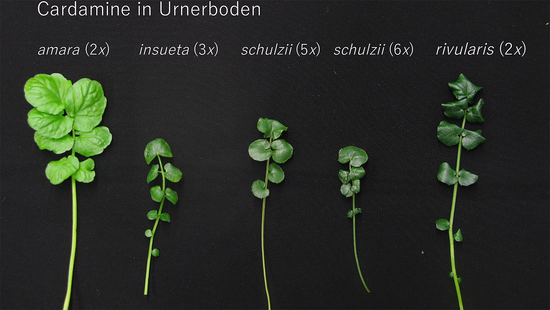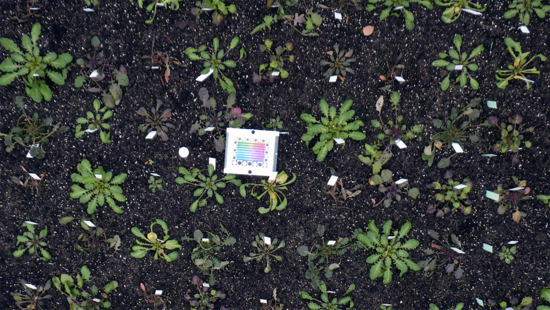Polyploidization and stress response in plants
Evolutionary Genomics
Polyploidization is a frequently observed phenomenon in plant species. It has played an important role as a driving force for evolution in the sense of diversification. Many allopolyploid species have distinct habitats (environmental tolerance), phenotypes or other traits from their parental species. These novel characteristics could have emerged by the combination of multiple genomes. In spite of its interesting role for evolution, polyploidization has not been well studied systematically way, mainly because of the lack of molecular and genomic tools. The recent technical advances, however, are changing the situation.
Our main interest is to reveal how polyploid species adapted to new environment after polyploidization. We focus on transcriptomics, by exploiting the power of latest molecular techniques, e.g. next generation sequencers, to separately detect the expression of homeologs, using genus Arabidopsisand their close relatives. In addition to carrying out molecular research in the wet lab, we collaborate with bioinformaticians, ecologists and cytologists in a multilateral approach to the evolutionary significance of allopolyploidization.
Research topics
- Polyploidization
- Transcriptomics
- Environmental adaptation
- Stress tolerance
- Genomics
Recent Publications
► Google Scholar: https://scholar.google.ch/citations?hl=de&user=S2jOT6wAAAA
- Phenotypic variation of a new synthetic allotetraploid Arabidopsis kamchatica enhanced in natural environment
R Shimizu-Inatsugi, A Morishima, B Mourato, KK Shimizu, Y Sato
Frontiers in plant science 13 2022 - Ultralong Oxford Nanopore Reads Enable the Development of a Reference-Grade Perennial Ryegrass Genome Assembly
Frei, Daniel; Veekman, Elisabeth; Grogg, Daniel; Stoffel-Studer, Ingrid; Morishima, Aki; Shimizu-Inatsugi, Rie; Yates, Steven; Shimizu, KK; Frey, JE; Studer, B; Copetti, Dario
Genome Biology And Evolution, 10.1093/gbe/evab159; AUG 2021 - ARPEGGIO: Automated Reproducible Polyploid EpiGenetic GuIdance workflOw
Milosavljevic, Stefan; Kuo, Tony; Decarli, Samuele; Mohn, Lucas; Sese, Jun; Shimizu, Kentaro K.; Shimizu-Inatsugi, Rie; Robinson, Mark D.
Bmc Genomics, 10.1186/s12864-021-07845-2, JUL 17 2021 - De Novo Genome Assembly of the Japanese Wheat Cultivar Norin 61 Highlights Functional Variation in Flowering Time and Fusarium-Resistant Genes in East Asian Genotypes
Shimizu, Kentaro K.; Copetti, Dario; Okada, Moeko; Wicker, Thomas; Tameshige, Toshiaki; et al.
Plant And Cell Physiology, 10.1093/pcp/pcaa152, JAN 2021 - Fine-scale empirical data on niche divergence and homeolog expression patterns in an allopolyploid and its diploid progenitor species
Akiyama, Reiko; Sun, Jianqiang; Hatakeyama, Masaomi; Lischer, Heidi E. L.; Briskine, Roman V.; Hay, Angela; Gan, Xiangchao; Tsiantis, Miltos; Kudoh, Hiroshi; Kanaoka, Masahiro M.; Sese, Jun; Shimizu, Kentaro K.; Shimizu-Inatsugi, Rie
New Phytologist, 10.1111/nph.17101, MAR 2021 - Multiple wheat genomes reveal global variation in modern breeding
Walkowiak, Sean; Gao, Liangliang; Monat, Cecile; Haberer, Georg; Kassa, Mulualem T.; et al.
Nature DOI: 10.1038/s41586-020-2961-x DEC 10 2020 - Metal accumulation and its effect on leaf herbivory in an allopolyploid species Arabidopsis kamchatica inherited from a diploid hyperaccumulator A. halleri
Shimizu-Inatsugi, Rie; Milosavljevic, Silvija; Shimizu, Kentaro K.; Schaepman-Strub, Gabriela; Tanoi, Keitaro; Sato, Yasuhiro
Plant Species Biology DOI: 10.1111/1442-1984.12304 DEC 2020 - A Recently Formed TriploidCardamine insuetaInherits Leaf Vivipary and Submergence Tolerance Traits of Parents
Sun, Jianqiang; Shimizu-Inatsugi, Rie; Hofhuis, Hugo; Shimizu, Kentaro; Hay, Angela; et al.
Frontiers In Genetics 10.3389/fgene.2020.567262 OCT 6 2020 - Artificial selection reveals the role of transcriptional constraints in the maintenance of life history variation
Pick, Joel L.; Hatakeyama, Masaomi; Ihle, Kate E.; Gasparini, Julien; Haussy, Claudy; et al.
Evolution Letters 10.1002/evl3.166 JUN 2020 - Fermentation Ability of Gut Microbiota of Wild Japanese Macaques in the Highland and Lowland Yakushima: In Vitro Fermentation Assay and Genetic Analyses
Hanya, Goro; Tackmann, Janko; Sawada, Akiko; Lee, Wanyi; Pokharel, Sanjeeta Sharma; et al.
Microbial Ecology DOI: 10.1007/s00248-020-01515-8 Early Access: APR 2020 - Artificial selection reveals the role of transcriptional constraints in the maintenance of life history variation
Pick, Joel L.; Hatakeyama, Masaomi; Ihle, Kate E.; Gasparini, Julien; Haussy, Claudy; et al.
Evolution Letters DOI: 10.1002/evl3.166 Early Access: APR 2020 - Genet assignment and population structure analysis in a clonal forest-floor herb, Cardamine leucantha, using RAD-seq
Tsujimoto, Michiaki; Araki, Kiwako S.; Honjo, Mie N.; Yasugi, Masaki; Nagano, Atsushi J.; et al.
Aob Plants, DOI: 10.1093/aobpla/plz080 Published: FEB 2020 - Trait-dependent resemblance of the flowering phenology and floral morphology of the allopolyploid Cardamine flexuosa to those of the parental diploids in natural habitats
Akiyama, Reiko; Milosavljevic, Stefan; Leutenegger, Matthias; Shimizu-Inatsugi, Rie
Journal Of Plant Research 133(2): 147-155 DOI: 10.1007/s10265-019-01164-0 MAR 2020 - …

Dr. Rie Shimizu-Inatsugi
University of Zurich
Department of Evolutionary Biology and Environmental Studies
8008 Zurich
Tel: +41 (0)44 635 47 60
Publications
Interdisciplinarity
- Collaboration with bioinformaticians for NGS data analysis
- Environmental study in field experiments with ecologists



